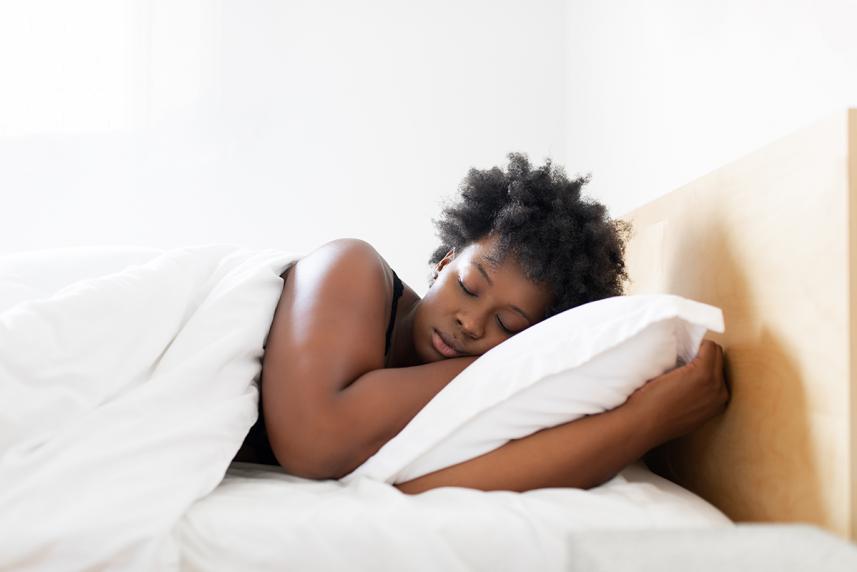
Why getting a good night’s rest is good for your heart

You can boost your heart health by getting quality sleep. Here’s why (and how to snooze better).
Exercise: Check. Nutritious diet: Ditto. Nicotine: You never touch the stuff. But there’s something else you should add to your heart-healthy routine. A solid 7 to 9 hours of sleep every night can help keep your heart healthy, says the American Heart Association.
Why? “Sleep is when the body repairs itself,” explains David Leopold, MD. He’s the medical director of integrative health and medicine at Hackensack Meridian Health in New Jersey. “There are so many physiological processes that go on when you’re sleeping.” Your body definitely needs a timeout.
Here’s the scoop on how sleep affects your heart and how to get the z’s you need.
The problem with poor sleep
When you don’t snooze well at night, your heart health can suffer. Poor sleep can put you at higher risk for many conditions linked to heart disease, says Hannah E. Bensimhon, MD. She’s a cardiologist at Dartmouth Hitchcock Medical Center in Lebanon, New Hampshire.
That doesn’t mean that if you stay up binge-watching Netflix tonight you’ll have a heart attack tomorrow. But over time, lack of sleep takes a toll on your heart:
- Poor sleep can lead to weight gain. Why? “When we don’t sleep, we tend to make poor food choices all around,” says Dr. Leopold. In one study, women who were sleep-deprived ate significantly more calories per day than those who had plenty of sleep. Those extra calories pile on the pounds. And obesity is a well-known risk factor for cardiovascular disease.
- Poor sleep may lead to high blood pressure. Your blood pressure naturally dips and remains lower all night long when you sleep. But if you stay awake longer, your body spends less time in this mode of lower blood pressure. Plus, lack of sleep increases stress hormones such as cortisol. This can raise blood pressure.
- Poor sleep often leads to less physical activity. It’s easy to see why: Without sleep, you’ll be too tired to work out. And the result of inactivity? You guessed it — a higher risk for heart disease. “Sleep affects not just your heart but your entire system,” says Dr. Leopold.
- Poor sleep can lead to depression. A large 2021 study found that people who didn’t get enough sleep had nearly 3 times the risk of mental distress (such as anxiety and depression). That’s bad, because depression is hard on your heart. Mental health disorders are connected with risk factors for heart disease, says the Centers for Disease Control and Prevention.
Whether you have a new prescription or need a refill, the Optum Store can help you save on your blood pressure medication — and have it shipped right to your door.
Tips for being a super sleeper
There are some strategies that can help you get a better night’s sleep. They just might improve your heart health as well. “Not every single strategy is right for everyone,” says Dr. Leopold. “But the key is to just do something to improve your sleep.” Give these tips a try:
Practice good sleep habits. Go to bed and get up at the same time every day, even on weekends. Having a bedtime routine can be helpful, too. Maybe you read a book, have a warm cup of tea or take a shower. The routine can trigger your body to know that it’s time to sleep.
Say no to screens. Using your phone or iPad in bed is a no-no. “Blue light from most screens disrupts melatonin production, and that disrupts your sleep,” says Dr. Bensimhon.
Keep it cool and dark. The ideal temperature for sleeping? Between 60 and 67 degrees. So turn down the thermostat. And if possible, open your bedroom window — that extra burst of oxygen can help you fall asleep faster. Block out light from outside with heavy curtains or a sleep mask.
Listen to sleep sounds. A white noise machine can help you drift off. You can tune it to pattering rain, a babbling brook or whatever helps you feel relaxed and sleepy.
Try meditation. “If you’re just not sleeping, meditation is one of the best things you can do,” says Dr. Leopold. Start out with a simple breath technique: Sit quietly and relax for a few minutes. Pay attention to your breath as you slowly inhale and exhale. If your mind wanders, gently bring it back to your breath. A meditation app can help, too.

Additional sources
7 to 9 hours of sleep: American Heart Association (2022). “American Heart Association Adds Sleep to Cardiovascular Health Checklist”
Weight study: Journal of the American Heart Association (2020). “Measures of Poor Sleep Quality Are Associated with Higher Energy Intake and Poor Diet Quality in a Diverse Sample of Women from the Go Red for Women Strategically Focused Research Network”
Depression study: Prevention of Chronic Disease (2021). “Effect of Inadequate Sleep on Frequent Mental Distress”
Mental health connection: Centers for Disease Control and Prevention (2020). “Heart Disease and Mental Health Disorders”
